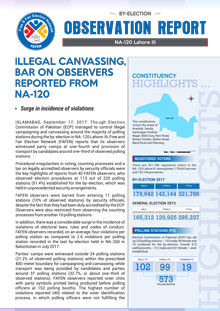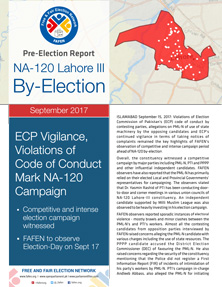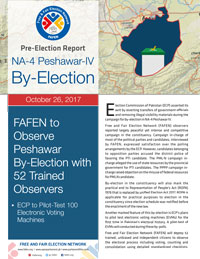-
Surge in incidence of violations
ISLAMABAD, September 17, 2017: Though Election Commission of Pakistan (ECP) managed to control illegal campaigning and canvassing around the majority of polling stations during the by-election in NA-120 Lahore-III, Free and Fair Election Network (FAFEN) reports that its observers witnessed party camps at one-fourth and provision of transport by candidates around one-third of observed polling stations.
Procedural irregularities in voting, counting processes and a bar on legally accredited observers by security officials were the key highlights of reports from 40 FAFEN observers, who observed election procedures at 113 out of 220 polling stations (51.4%) established for the by-election, which was held in unprecedented security arrangements.
FAFEN observers were barred from entering 11 polling stations (10% of observed stations) by security officials, despite the fact that they had been duly accredited by the ECP. Observers were also restricted from observing the counting processes from another 10 polling stations.
In addition, there was a considerable surge in the incidence of violations of electoral laws, rules and codes of conduct. FAFEN observers recorded, on an average, four violations per polling station as compared to 2.6 violations per polling station recorded in the last by-election held in NA-260 in Balochistan in July 2017.
Parties’ camps were witnessed outside 24 polling stations (21.2% of observed polling stations) within the prescribed 400-meter boundary for campaigning and canvassing, while transport was being provided by candidates and parties around 37 polling stations (32.7%, or about one-third of observed stations). FAFEN observers reported voter chits with party symbols printed being produced before polling officers at 152 polling booths. The highest number of violations reported (40) related to the voter identification process, in which polling officers were not fulfilling the procedural requirement for polling officers to call out loud the name of each voter so that polling agents can hear and raise objections, if any.
Although the secrecy screen was installed at each of the 113 polling booths observed, FAFEN observers reported 11 instances of breach of voters’ secrecy. This reporting indicates that either security or polling officials or other voters went behind the secrecy screens unlawfully. FAFEN observers reported from 129 polling booths the lack of availability of critical materials, including Form XIV (Statement of Count) and Form XV (Ballot Paper Account).
FAFEN observers reported from 16 polling stations that voters were allowed to queue of voters after 5:00 pm, and were facilitated to vote by the election officials.
The NA-120 seat fell vacant after the disqualification of former Prime Minister and PML-N President Muhammad Nawaz Sharif by the Supreme Court of Pakistan. The ECP set-up 220 polling stations, including 102 male, 99 female and 19 combined polling stations. A total of 573 polling booths – 312 male and 261 female – were set up on September 17, 2017. A total of 321,786 citizens, including 142,144 women, are registered as voters in the constituency. ECP distributed 350,000 ballot papers to polling stations.
FAFEN observed the pre-election process and polling day through 40 trained, non-partisan observers. The polling day observation covered 113 out of 220 polling stations (51.4%) set up in the constituency. Observers spent between 60 and 120 minutes in each polling station to document their observations on a standardized checklist that is based on the provisions of the Representation of the Peoples Act 1976, Conduct of Elections Rules 1977 and instructional handbooks that the ECP has provided to election officials. These laws and rules governed the NA-120 by-election pending implementation of the Unified Election Law, 2017, adopted in August.
During the pre-election phase, the constituency witnessed an intense and competitive campaign by major political parties, including PML-N, PTI, PPPP and other influential independent candidates. Rallies by major political parties continued throughout Election Day, which is a direct violation of the ECP’s code of conduct. FAFEN observers also reported issues in the set-up of polling stations, such that polling agents could not see the polling process. At nine polling stations, FAFEN observers reported that the polling agents were seated outside the polling stations. A plausible reason for this issue could be that these polling stations were set-up in small buildings that did not have adequate space to cater to a large number of polling agents. At certain polling stations, voters also experienced similar issues of congested polling booths.
Earlier, the ECP had sought help from the Pakistan Army to ensure polling day security and instructed that Close Circuit Television (CCTV) cameras should be installed inside polling stations. Security personnel were stationed inside and outside polling stations. According to a notification issued by ECP, security officials were given the authority to exercise powers under Sections 4 and 5 of the Anti-Terrorism Act, 1997, and could also exercise First Class Magisterial powers in case of impersonation of a voter, capturing of polling stations, illegal canvassing or illegal practices related to the polling process. However, no such cases were reported by FAFEN observers.
To download Urdu Press Release, click here | To download complete report, click here




